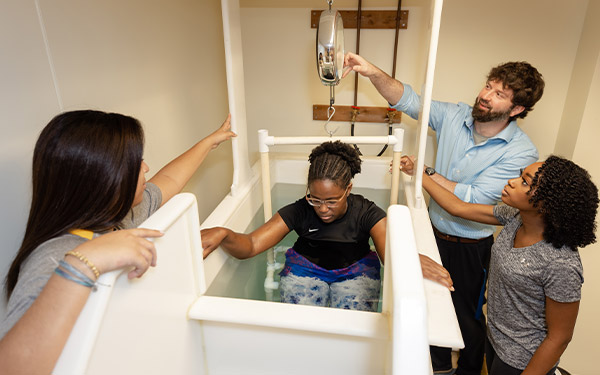GSW Website Search
- Apply
- About
- Academics
- Admissions
- Financial Aid
- Athletics
- Student Life
- myGSW
- A-Z Index
- Directory
- Map
- Visit
- Give
Exercise Science is a broad-reaching degree that prepares students for various health-sciences careers related to health, movement, performance, and rehabilitation. The program builds the foundational scientific background and practical, professional skills necessary to succeed in dynamic performance or health-care environments, as well as to pursue graduate studies or professional advancement in exercise-science/physiology or allied health fields.
Potential career pathways include:
Prepare for graduate education in:
Throughout the curriculum, exercise science students will build a scientific understanding of why and how exercise is beneficial to health, as well as how use this knowledge to improve quality of life and reduce disease. Additionally, a foundational understanding is developed on how to work productively with performance-oriented populations. Towards building this knowledge base, exercise scientists will study exercise nutrition, strength and conditioning, kinesiology, exercise physiology, clinical exercise physiology, exercise prescription, and more.
Bachelor of Science in Exercise Science
Storm Dome
Lower Level
timothy.tolbert@gsw.edu
benjamin.meador@gsw.edu

Lab experiences provide hands-on learning and practical skills, while off-campus field hours build real-world experience and bolster preparation for employment or graduate schools.
Exercise Science students complete both a practicum and an internship as part of their in-major credit hours. These programs gain our students the opportunity for significant on-the-job experience, helping them mold career goals, build professional networks, and gain a significant competitive edge when applying for job positions or graduate schools.
Practicum is typically completed sometime during the junior year, with 180 field-experience hours at a location of the student’s choosing and advisor’s approval. The student can select the area of interest (Physical Therapy, Occupational Therapy, Athletic Training, etc.) and the facility for the experience. This gives students the opportunity to consider whether or not it is indeed the area they want to pursue.
The Internship is intended to be taken the last semester before graduation, and entails 540 hours in the field. Ideally, students will have refined their goals somewhat during practicum and the following courses, and during internship will be able to gain a significant number of experience hours in the field of their choice.
Common Internship and Practicum locations include:
Meet with your faculty adviser for approval of your site choice. It is strongly suggested that you start this process at least 5-6 months prior to the time you intend to start your practicum or internship.
Bring in your signed Clinical Initiation Form to the Clinical Coordinator.
See Mrs. Andrea Pinckard in College of Nursing and Health Sciences, Room 225.
The Clinical Coordinator will determine the credentialing requirements (eg. drug test, CPR certification, immunizations, etc.) of the chosen agency and notify the student of requirements and if application to ACEMAPP is needed:
All students, regardless of chosen facility, must have an active BLS/CPR certification, must maintain liability insurance during their Field Experience, and must have signed the Field Experience Student Conduct Agreement. The semester prior to the internship/practicum, students should access the insurance site at www.HPSO.com, then click on "get a quote", then click on "Student or Recent Graduates", then click on "student" on the “start your quote” page. Students need to be prepared to pay with a debit or credit card that has their name on the card and insurance proof is available within 24 hours. If the student is not prepared to pay in this manner, they must download the paper copy and submit as instructed which may take up to two weeks to process.
All clearancing through the Clinical Coordinator must be complete before the student begins accruing hours at their facility. Students will typically not be registered for the practicum/internship courses until their clearance requirements have been met.
Going through this program at GSW has taught me so much about my future career and has done an amazing job preparing me for my future endeavors in graduate school. The professors that I have had truly care about us as students. They want us to succeed and achieve all of our goals. The invaluable guidance and support I have received from everyone in our department is truly something special.
